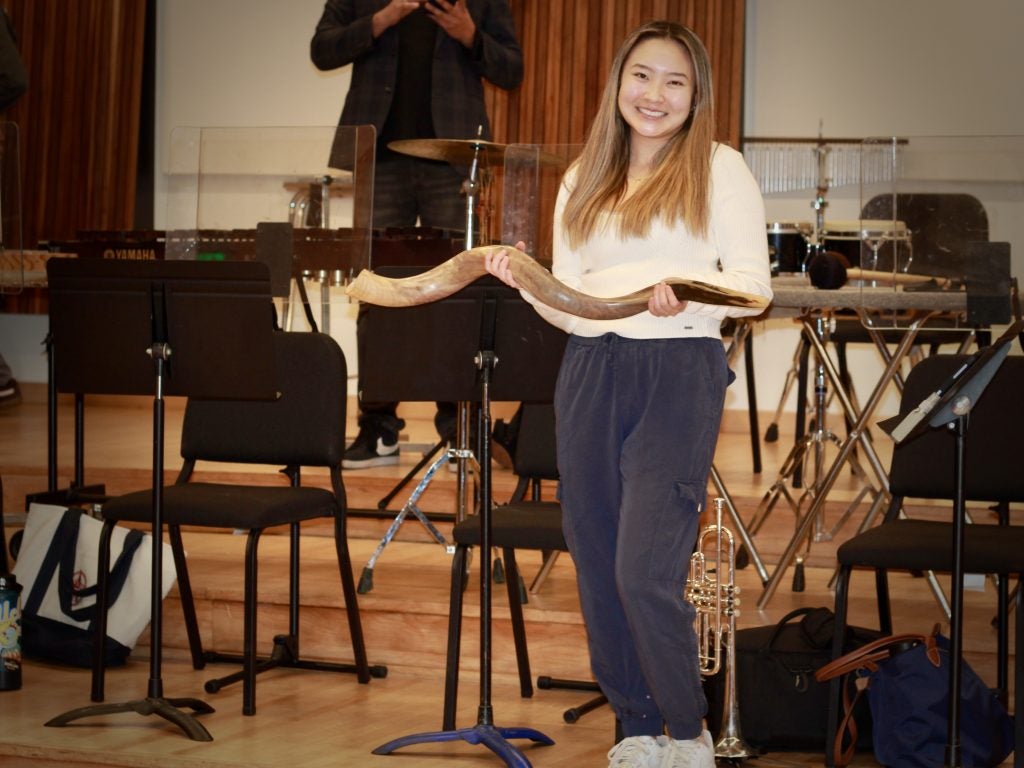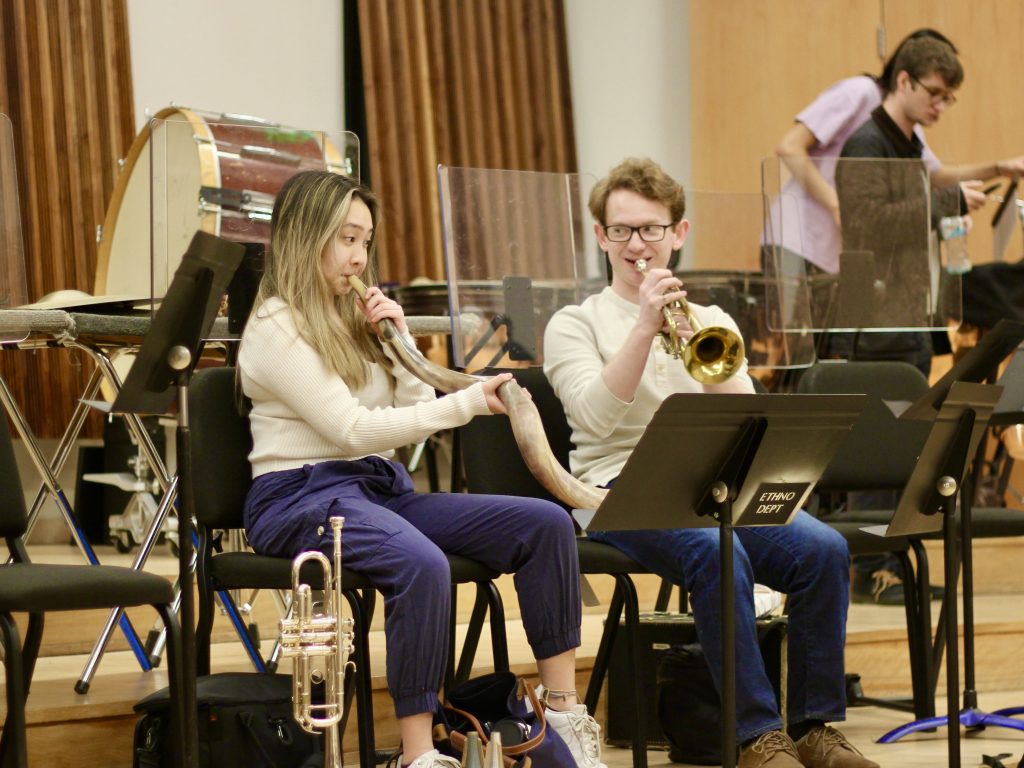As events go, it doesn’t get much bigger than the upcoming Gates of Justice concert on Feb. 26 at Royce Hall. International stars? Check. Jazz royalty? Check. Anticipated world premieres? Check.
As key contributors to the Music and Justice series presented by the Lowell Milken Center for Music of American Jewish Experience, UCLA students will be on stage performing alongside the Brubecks, alongside India Carney, and playing brand-new works by UCLA faculty Arturo O’Farrill and Diane White-Clayton. They will repeat these astonishing performances in their entirety at Holman Methodist United Church on Feb. 28. Opportunities to perform under these circumstances are part of what drives talent to The UCLA Herb Alpert School of Music.
We sat down with Remy Ohara (Remy) and Shyheim Hinnant (Shy), two School of Music students who will be performing on different pieces in the concert. Remy Ohara, a second-year trumpet performance major from Honolulu, will perform with the orchestra on David Brubeck’s The Gates of Justice. Shyheim Hinnant is a second-year master’s student in voice performance. He will be one of nine student vocalists premiering Diane White-Clayton’s new work Dear Freedom Rider.
Tell me about your role in Gates of Justice, Remy.
Remy: I’m playing the second trumpet part, but I am playing the shofar solo in the introduction to the piece.
What’s a shofar?
Remy: I just got the instrument last week. It’s an instrument made out of a ram horn, it’s a sacred instrument.

How hard is it to play the shofar?
Remy: It’s pretty damn hard. It’s essentially in one key, so you have to hope it is in the right key. Both of the ones I have tried are not in the right key, so there’s that. But, thankfully, one of the Brubeck brothers is going to bring three of his eight shofars for me to try. It’s really exciting to have access to so many rare instruments to try.
Shy, tell me about the piece you will be performing.
Dr. Dee (Diane White-Clayton) invited me to participate in late December. She asked eleven vocalists in all, and we all started by writing letters to the Freedom Riders, people who went into the South in the 1960s to fight against segregation. These were people of all different backgrounds, Black people, Jewish people, white people. They endured a lot. They were beaten, arrested, spat on. I was fortunate to already know about the Freedom Riders, because my grandfather was adamant that my sister and I know our history, but Dr. Dee gave us great resources too. Then she asked us to write a letter thanking them, or asking them questions, or whatever else we wanted to say to them.
Are there lyrics in the piece about the Freedom Riders?
Shy: Yes, but the singers wrote the lyrics.
You wrote the lyrics?
Shy: We all did. The lyrics are from the letters that we wrote to the Freedom Riders.
“Thank you for putting your life on the line in order for a young black man like me to thrive in today’s America. You entered forbidden spaces and transformed them into welcoming environments.”
-Shyheim Selvan Hinnant, Letter to a Freedom Rider.
That seems counterintuitive for writing lyrics.
Shy: It’s been cool. I mean, it’s hard music. She’s written it in a twelve-tone row, so it’s not in a standard major or minor chordal structure. You really have to listen and feel the music. It takes tremendous precision and attention to detail. It’s not music that you can just read on sight. I mean, maybe somebody can, but I can’t.
Both Brubeck’s The Gates of Justice and Diane White-Clayton’s Dear Freedom Rider are calls for social justice. Is that an appropriate role for music?
Remy: They’ve always been intertwined. And well before Dave Brubeck called for social justice. I’m taking an ethnomusicology class that discusses segregation in the early music industry. I wasn’t aware of the extent to which music was raced, how they literally categorized the genres by race. It’s amazing to see how musicians turned this back on itself.
Shy: Music is a magical thing. I don’t say this to be cliché. I think it is able to connect people and to open people and make them feel something beyond the words they hear sung. In its totality, it is something greater. It can change viewpoints. It has changed viewpoints. There’s still so much to do, but we’ve come a long way, and music has been a part of that.
What has music done to make those changes? What historic role did music play in the Civil Rights Movement?
Shy: Therapy. Expression. Love. Emotion. Not just being able to escape bad emotions, but to cope with them.
Remy: Personality is a huge aspect of music. People used to be very hemmed in by categorization, and that stifled creativity. I think this concert celebrates a lot of the music that broke up those categories, celebrates artists both living and dead who challenged boundaries.
And what about you? What does music mean to you, beyond this upcoming concert?
Remy: I’m a big fan of storytelling. Early on, when I was in high school, we played a piece that was about the bombing of Pearl Harbor. Now, my childhood home literally overlooks Pearl Harbor, and I really knew that story. I’m a fourth-generation Hawaiian, and my great-grandparents experienced first-hand World War II and a lot of the racism that went along with being of Japanese descent during that time. So, playing that piece was an amazing experience for me. I really felt it. It taught me just how visceral music could be.
Shy: I think my moment in classical music as a queer Black man is showing myself every day. Yes, there are great Black opera singers, and I want that to become normal. I want to do my job, and sing opera. Every time I come on campus, every time I attend an opera rehearsal, every time I do something that is not within the norm … you know what I’m saying? I’m six-foot-two, but I’m not a basketball player. I’m an opera singer. I feel like I am the proof, I am the moment.


